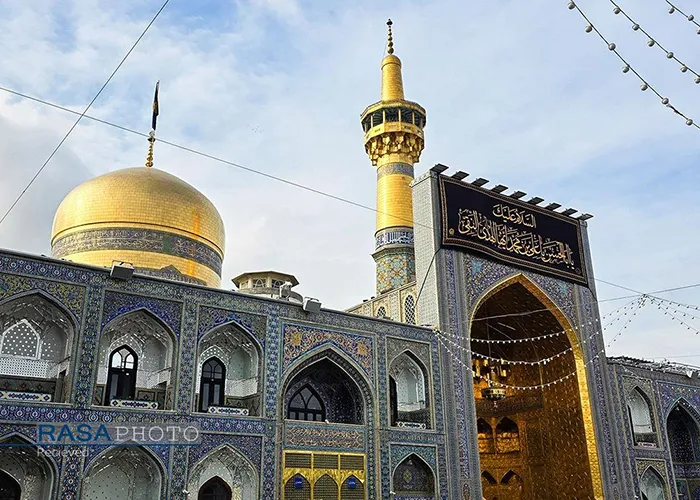Editorial – volume02 Issue01
“Reflecting on Key Religious Milestones: Lessons for the Present and Future”
Introduction:
As we step into the new year, it is a moment for reflection and renewal. The milestones we commemorate this week—ranging from the beginning of the year to the martyrdoms of great figures like Imam al-Hadi (A.S) and Ibrahim b. Malik al-Ashtar, to the birth of Imam al-Baqir (A.S) and the intellectual contributions of scholars like Abu Rayhan al-Biruni and Shihab al-Din al-Suhrawardi— as well as the World Braille Day serve as spiritual touchstones. These events provide valuable lessons for us all, offering insights into justice, sacrifice, social responsibility, knowledge, and faith. In this issue of Friday Bulletin, we explore these significant events through the lens of the Qur’an and Hadith, drawing messages that resonate with the challenges and opportunities of our contemporary world.
1st January 2025 – 30th Jumada II: The Beginning of the Year 2025 (Gregorian)
The start of the Gregorian year is a significant occasion for reflection, goal-setting, and spiritual renewal. In Islam, time is a valuable resource, and each moment should be utilised to its fullest for self-betterment and spiritual growth. The Qur’an repeatedly emphasises the importance of time and warns of its fleeting nature:
وَالْعَصْرِ (1) إِنَّ الْإِنسَانَ لَفِي خُسْرٍ (2) إِلَّا الَّذِينَ آمَنُوا وَعَمِلُوا الصَّالِحَاتِ وَتَوَاصَوْا بِالْحَقِّ وَتَوَاصَوْا بِالصَّبْرِ (3)
By time, indeed, mankind is in loss, except for those who have believed and done righteous deeds and advised each other to truth and advised each other to patience (Surah Al-Asr, 103:1-3).
This verse reminds us that time is one of Allah’s greatest gifts, and we must use it wisely to engage in good deeds, seek knowledge, and live a life of virtue. The new year is a perfect opportunity for us to reflect on our past actions, set new intentions, and align our lives with the values of Islam. For today’s generation, this is a call to make each moment count in our personal and collective spiritual journeys.
Martyrdom of Ibrahim b. Malik al-Ashtar (71/690)
Ibrahim b. Malik al-Ashtar, the son of the great companion of Imam Ali (A.S), was a remarkable figure whose martyrdom highlights the sacrifice for justice and truth. The life of Ibrahim is distinguished by his participation in avenging Imam Hussain (A) and in the uprising of Mukhtar.
Ibrahim’s martyrdom encourages us to reflect on our own commitment to justice and truth. For today’s youth, the message is clear: justice is a cause worth pursuing, even at great personal cost. The struggle for justice, as demonstrated by figures like Ibrahim b. Malik al-Ashtar, remains timeless and essential in our world today.
2nd January 2025 – 1st Rajab: Birth of Imam al-Baqir (A.S) (According to a Report)
Imam al-Baqir (A.S) is revered for his profound knowledge and contribution to Islamic jurisprudence and theology. His legacy is not only that of a spiritual leader but also as an intellectual giant who shaped many aspects of Islamic teachings. Imam al-Baqir’s approach to knowledge and learning is beautifully captured in the following Hadith:
قَالَ عَلَيْهِ السَّلاَمُ: “مَا حَقُّ اللَّهِ عَلَى الْعِبَادِ قَالَ أَنْ يَقُولُوا مَا يَعْلَمُونَ وَيَقِفُوا عِندَ مَا لَا يَعْلَمُونَ”
Imam Baqir said: “The right of Allah upon His servants is that they speak of what they know and remain silent about what they do not know.” (al-Kafi, Vol. 1, p. 43).
This profound statement calls for humility and integrity in our pursuit of knowledge. Imam al-Baqir’s teachings remind us that knowledge is not just about accumulation but also about its ethical and responsible application. For today’s generation, this is a critical message: the pursuit of knowledge should be done with the intention of serving the truth and striving for greater understanding of Allah’s will. Knowledge, in this sense, becomes both a tool for personal growth and a means to strengthen our relationship with the Creator. This Hadith is further discussed in the Hadith of the Week.
3rd January 2025 – 2nd Rajab: Demise of Abu Rayhan al-Biruni
Abu Rayhan al-Biruni was a pioneering scholar whose contributions spanned many fields, including astronomy, mathematics, and anthropology. His intellectual legacy continues to inspire scholars around the world. In his pursuit of knowledge, al-Biruni exemplified the Islamic belief in the importance of seeking knowledge in all fields, as the Prophet Muhammad (PBUH) famously said:
طَلَبُ الْعِلْمِ فَرِضَةٌ عَلَى كُلِّ مُسْلِمٍ وَمُسْلِمَةٍ
Seeking knowledge is an obligation upon every Muslim, male and female (Kans-ol-favaed, P. 239).
Al-Biruni’s work reflects the spirit of this Hadith, as he made significant contributions to both religious and scientific fields. For today’s scholars, the message is clear: seeking knowledge in all its forms—whether religious, scientific, or philosophical—is essential for a well-rounded understanding of the world and our Creator. This is an important reminder that knowledge has no boundaries and can lead us closer to the truth in all aspects of life.
4th January 2025 – 3rd Rajab: Martyrdom of Imam al-Hadi (A.S) (July 1, 868)
Imam al-Hadi (a), the tenth Shia Imam, lived during a time when there were numerous questions and doubts regarding the fundamental principles of faith. One of his primary missions was to clarify and explain these theological issues, particularly the concept of Tawhid (the oneness of God). He taught the people that Allah is present everywhere, and His dominion over both the heavens and the earth is equal, transcending all limitations of time and space.
In addition to his theological teachings, Imam al-Hadi (a) placed great emphasis on nurturing and training capable individuals. He is known for mentoring many distinguished students, including notable figures such as Abdul-Azim al-Hasani (a), Ahmad ibn Hamzah, Saleh ibn Muhammad al-Hamdani, Khayran al-Khadim, Ayyub ibn Nuh, Ali ibn Ja’far al-Hamani, and Abu Ali ibn Rashid. Sheikh Tusi and other scholars have recorded that more than 180 narrators transmitted traditions from Imam al-Hadi (a).
Moreover, Imam al-Hadi (a) is also known for transmitting various important prayers and visits (ziyarat), including the famous Ziyarat al-Ghadir and the Ziyarat al-Jaami’ah al-Kabeerah, one of the most prominent and well-known prayers which highlights the revered status of the Imams.
For the present generation, the life of Imam al-Hadi (a) offers invaluable lessons on the importance of strengthening our understanding of faith, the pursuit of knowledge, and the need for nurturing future leaders. His role as an educator and guide serves as an inspiration for both religious scholars and individuals seeking to deepen their connection with God through both understanding and action.
4th January 2025 – World Braille Day
World Braille Day is observed every year to honour the birth of Louis Braille, the inventor of the Braille system, which revolutionised the world for blind and visually impaired individuals. This day serves as an important reminder of the significance of accessibility, inclusion, and equal opportunities for all members of society, regardless of their physical abilities.
In Islam, the message of empathy, support, and inclusivity is consistently emphasised, reminding us that every individual, regardless of their challenges, has the right to education, dignity, and respect. Prophet Muhammad (PBUH) emphasised the importance of inclusivity and care for the vulnerable:
مَنْ أَعَانَ ضَعِیفاً فِی بَدَنِهِ عَلَى أَمْرِهِ أَعَانَهُ اَللَّهُ عَلَى أَمْرِهِ (بحارالانوار، ج ۷۵، ص ۲۱).
Whoever helps a weak person in their physical condition, Allah will help them in their own affairs.
For today’s generation, World Braille Day is a call to promote inclusion and provide opportunities for those who may be less fortunate or face difficulties, particularly those who are blind or visually impaired. As members of the Muslim community, we are encouraged not only to provide access to education and resources for the blind but also to make their lives more inclusive, dignified, and fulfilling. Just as the Prophet (PBUH) advised us to treat others with empathy, we are reminded that supporting those with disabilities, including through systems like Braille, aligns with our Islamic values of justice, kindness, and equality.
5th January 2025 – 4th Rajab: Demise of Shihab al-Din al-Suhrawardi (1191)
Shihab al-Din al-Suhrawardi, known as al-Shaykh al-Ishraq, was a renowned philosopher whose works bridged the gap between mysticism and philosophy. His legacy continues to influence Islamic thought and the intellectual world at large. Al-Suhrawardi’s philosophy emphasised the importance of inner illumination and the pursuit of divine knowledge. He is a very good example of this Hadith of Imam Ali (a.s.) who said:
قَالَ عَلَيْهِ السَّلاَمُ: “العِلْمُ نُورٌ يَقْذِفُهُ اللَّهُ فِي قَلْبِ مَن يَشَاءُ” (مصباح الشريعة، ۱، ۱۶).
“Knowledge is light that Allah places in the heart of whom He wills.”
Al-Suhrawardi’s emphasis on illumination aligns with this Hadith, highlighting the importance of divine knowledge in guiding human beings. For today’s intellectuals, his teachings remind us that true knowledge is not just about intellectual attainment but also about spiritual enlightenment. Seeking knowledge in Islam should be a path to greater closeness to Allah and a deeper understanding of the divine.
editor's pick
news via inbox
Subscribe to the newsletter.




